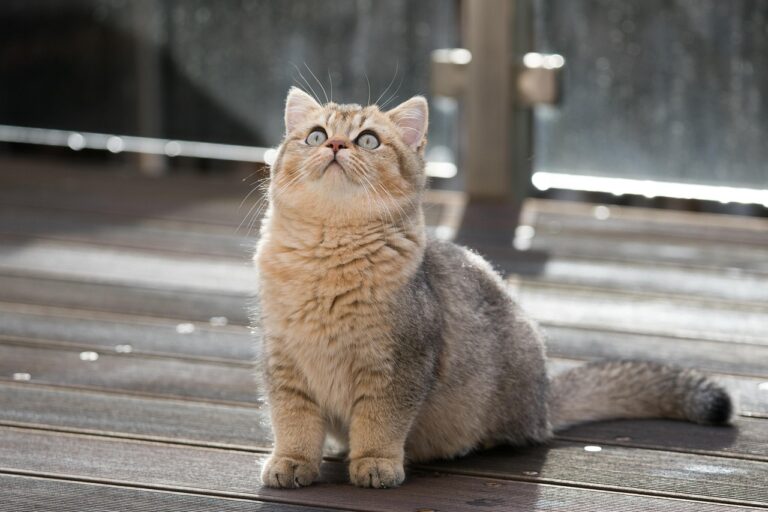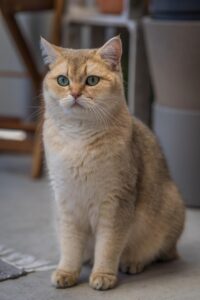Contents
- 1 🐱 Introduction to British Shorthair Breeders’ Cats
- 2 💡 Why Choose a British Shorthair?
- 3 🎯 Understanding the Breed Standards
- 4 🔍 British Shorthair Breeders: What to Look For
- 5 🏆 Top 10 British Shorthair Breeders in 2025
- 6 ❓ Questions to Ask a Breeder Before Buying
- 7 💸 Costs of British Shorthair Kittens
- 8 🍽️ How Often Should I Feed My British Shorthair Cat?
- 9 🔄 British Longhair vs. British Shorthair
- 10 ❌ Common Myths About British Shorthairs
- 11 🍫 Are Chocolate British Shorthairs Rare?
- 12 ❓ Frequently Asked Questions About British Shorthair Cats
- 13 🎯 Conclusion
🐱 Introduction to British Shorthair Breeders’ Cats
The British Shorthair is one of the most beloved cat breeds globally, renowned for its calm nature, plush coat, and charming chubby cheeks. Whether you’re a seasoned cat enthusiast or considering your first feline companion, these cats bring a mix of elegance and affection that’s hard to resist.
Originating from the UK, British Shorthairs have evolved from street-smart mousers to one of the most sought-after pedigree breeds. Their popularity has surged not only because of their looks but also due to their easygoing nature—making them perfect for families, singles, and even first-time pet owners.
💡 Why Choose a British Shorthair?
If you want a cat that’s low-maintenance, affectionate without being clingy, and irresistibly adorable, the British Shorthair checks all boxes.
Key Reasons to Choose This Breed:
-
Loyal yet independent
-
Ideal for apartment living
-
Minimal grooming needs
-
Gets along with kids and other pets
-
Long lifespan (12–20 years)
🎯 Understanding the Breed Standards
To ensure you’re buying from ethical British Shorthair breeders, it’s essential to understand the breed standards set by major feline associations such as TICA, CFA, and GCCF.
Coat, Colour, and Eye Standards
-
Dense and plush coat, often compared to velvet
-
Common colours: blue (most iconic), cream, lilac, chocolate
-
Eye colours vary but should be deep and vivid: copper, gold, or blue (for colourpoints)
Personality Traits and Temperament
-
Calm and quiet
-
Not overly vocal
-
Affectionate but not needy
-
Intelligent and easily trained
🔍 British Shorthair Breeders: What to Look For
When searching for British Shorthair breeders, it’s vital to prioritise health, ethics, and transparency over just aesthetics.
Health Testing & Genetic Screening
A good breeder will:
-
Test for PKD (Polycystic Kidney Disease)
-
Provide proof of vaccinations
-
Offer genetic screening certificates
-
Include microchipping
Socialisation & Early Care
Reputable catteries will ensure kittens are:
-
Raised in-home, not in cages
-
Socialised with children and adults
-
Litter trained
-
Exposed to basic grooming
Contracts and Guarantees
Look for:
-
Health guarantee (1–2 years)
-
Return clause if you can no longer keep the kitten
-
Full pedigree papers
🏆 Top 10 British Shorthair Breeders in 2025
Here’s a curated list of highly rated and ethical breeders across major regions.
UK-Based Breeders
-
Caramia Cats (London) – TICA registered, award-winning lines
-
Silvercloud British Shorthairs (Manchester) – Specialises in blue and lilac
USA-Based Breeders
-
CheshireSmile Cattery (California) – Known for rare chocolate variants
-
British Kingdom Cats (Texas) – Offers international shipping
European Reputable Catteries
-
Blue Whiskers (Germany)
-
Cattery de Prestige (France) – Focus on show-quality lines
-
British Blue Gems (Netherlands) – Ethical breeding with home-raised kittens
Additional breeders:
-
RegalPaws Cattery (Canada)
-
CloudyWhiskers (Australia)
-
Nordic Brits (Norway) – Cold-weather adapted British Shorthairs
❓ Questions to Ask a Breeder Before Buying
When buying a British Shorthair kitten, don’t hesitate to ask your breeder these critical questions:
-
Can I see the kitten’s parents?
This allows you to assess the health and temperament of the breeding pair, which often reflects the kitten’s nature. -
What health tests have the kittens and their parents undergone?
The breeder should provide documentation of genetic screening and vaccinations. -
How are the kittens socialised?
Early socialisation ensures that the kitten will adapt well to family life. -
Do you offer a health guarantee?
A trustworthy breeder will offer at least a 1-year health guarantee on the kitten. -
What food are the kittens being fed?
Knowing the kitten’s diet can help ensure a smooth transition when you bring your new pet home.
💸 Costs of British Shorthair Kittens
The price of a British Shorthair kitten can vary widely depending on factors like location, colour, and the breeder’s reputation.
Initial Kitten Price
On average, expect to pay between £500 – £3,000 for a British Shorthair kitten.
-
Show quality kittens (with exceptional pedigree) can cost upwards of £2,000.
-
Pet-quality kittens (ideal for companionship) are typically in the £500-£1,500 range.
Ongoing Expenses
Aside from the initial purchase price, owning a British Shorthair comes with additional costs:
-
Food: £15-£30 per month (depends on quality)
-
Routine veterinary care: £50-£150 per year
-
Insurance: £10-£25 per month
-
Grooming: Although British Shorthairs are relatively low-maintenance, some owners opt for professional grooming, which can cost around £30-£60 per session.
🍽️ How Often Should I Feed My British Shorthair Cat?
British Shorthairs have a hearty appetite and benefit from a balanced diet tailored to their age, activity level, and health. Here’s a basic guideline:
Kittens (up to 6 months)
-
Feed 3-4 times per day
-
Offer wet food combined with dry food for balanced nutrition
-
Ensure high-quality kitten food to support their rapid growth
Adults (6 months and older)
-
Feed 2 times per day (morning and evening)
-
Opt for a high-protein diet with controlled fat to avoid obesity
-
Keep treats minimal to maintain a healthy weight
Seniors (7+ years)
-
Provide 2 meals per day, and consider food formulated for senior cats
-
Regularly monitor their weight and adjust their diet accordingly
Tip: Always consult with your vet to personalise your cat’s diet based on its health needs.
🔄 British Longhair vs. British Shorthair
Although both the British Shorthair and British Longhair hail from the same origins, they have key differences.
Key Differences:
-
Coat Length:
The British Shorthair has a dense, plush coat, while the British Longhair has a long, flowing coat that requires more grooming. -
Temperament:
Both breeds are calm and affectionate, but the British Longhair may be a bit more playful and energetic due to their active nature. -
Maintenance:
British Shorthairs are low-maintenance compared to their longhaired cousins, who need regular grooming to prevent mats and tangles.
❌ Common Myths About British Shorthairs
Despite their popularity, there are some common misconceptions about British Shorthairs that need debunking:
Myth 1: They’re lazy and don’t need exercise.
While they enjoy lounging, British Shorthairs are still playful and enjoy interactive toys. Providing mental and physical stimulation will keep them happy.
Myth 2: They’re always aloof.
While they’re not overly clingy, British Shorthairs are affectionate without being demanding. They’ll follow you around and enjoy being near you, but they aren’t typically lap cats.
Myth 3: They require a lot of grooming.
This is false for the short-haired variety. The British Shorthair’s coat is low-maintenance, requiring only occasional brushing.
🍫 Are Chocolate British Shorthairs Rare?
Yes! The chocolate British Shorthair is one of the more rare and sought-after variations. Their rich, warm coat colour, often with golden or amber eyes, makes them stand out from the traditional blue (grey) and cream British Shorthairs.
The chocolate coat is a recessive gene, meaning it’s rarer and often more expensive. Additionally, because of its rarity, the chocolate British Shorthair tends to have a unique allure for collectors and cat lovers.
❓ Frequently Asked Questions About British Shorthair Cats
1. Are British Shorthairs good for first-time cat owners?
Yes! British Shorthairs are an excellent choice for first-time cat owners due to their calm and easy-going temperament.
2. How do I know if a British Shorthair is healthy?
A healthy British Shorthair should have clear eyes, a shiny coat, and an alert, active nature. Ask your breeder for health certificates and proof of vaccinations.
3. How long do British Shorthairs live?
The average lifespan of a British Shorthair is between 12 and 20 years, with many living long and healthy lives with proper care.
4. Do British Shorthairs shed a lot?
No, British Shorthairs are considered to be moderate shedders. Regular brushing will help manage shedding and keep their coat in great shape.
5. Can British Shorthairs live alone?
Yes, British Shorthairs are quite independent and can handle being left alone for longer periods than other breeds, but they still enjoy companionship.
6. What is the best food for a British Shorthair?
High-quality, protein-rich foods designed for their age group (kitten, adult, or senior) are ideal. You may want to feed a mix of wet and dry food.
🎯 Conclusion
Choosing the right British Shorthair breeder can be a rewarding experience, leading you to a loving companion that will enrich your life for many years. Remember to do your research, ask the right questions, and ensure the breeder prioritises health, ethics, and socialisation.
Whether you’re drawn to their plush coats, calm demeanor, or adorable chubby cheeks, British Shorthairs are an ideal choice for many types of families and pet owners. With the proper care and attention, your British Shorthair will provide years of happiness and companionship.



